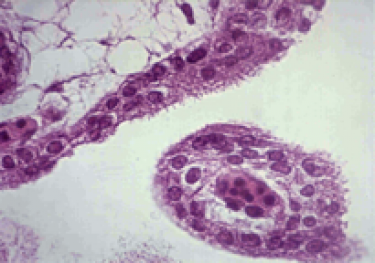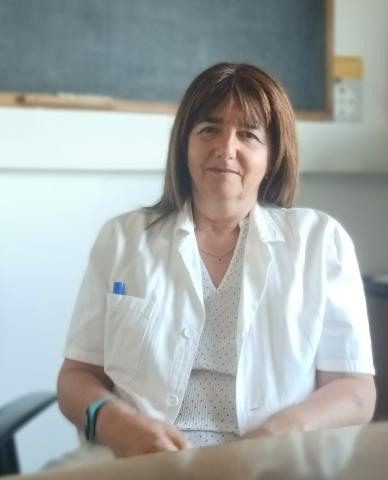The research program coordinated by Roberta Bulla, is mainly focused in trying to define the contribution of innate immunity, with particular regard to the complement system and macrophages, to embryo implantation in physiologic and pathologic pregnancy. The group has dedicated its research activity on reproductive immunology and developed techniques to set up primary culture of cells isolated from human tissues with particular regard to endothelial cells (from normal and pathological decidua, uterus and skin) villous and extravillous trophoblast and other decidual cells, which are now routinely employed for several research projects. Since women with endometriosis have a lower implantation rate and, at first pregnancy, have an increased risk of impaired obstetric outcome, we extended our interested to the study of the immunological mechanisms involved in this chronic disorder.
More recently, Bulla’s group extended its study to the alternatives roles of the complement system in tumour growth and invasion, since tumour cells have borrowed many of the mechanisms for invasion used by the trophoblast to intrude into host tissue and to establish their blood supply.

1) Role of the complement system in tissue and vascular remodelling in normal and pathological pregnancies.
Successful implantation of the foetus into the uterine wall of the mother depends on special interactions that the foetus establishes with the mother. They both contribute to the structural organization of the placenta, a newly formed organ that plays a key role in the regular progression of pregnancy till it reachesfull term. Molecular implantation and early placentation defects process is likely to be the “primary lesion” of several pregnancy disorders, therefore the study of implantation and the early steps of human development are fundamental for the understanding of the mechanisms involved in the pathogenesis of pathological pregnancies.
In this context, one of the aim of our group is to investigate the contribution played by the complement system in the pathogenesis of pre-eclampsia. The study is finalized with the development of molecular markers for the investigation and the diagnosis of pre-eclampsia. The molecular pathways characterised by these markers are important for the definition of potential therapies for this pregnancy pathology.
We have recently demonstrated that C1q, the recognition molecule of the classical pathway activation of the complement system is present in placenta, and is produced locally as well as being involved in the endovascular (Bulla, Agostinis et al. MI 2008) and interstitial invasion (Agostinis, Bulla et al. JI 2012) of trophoblast cells. Collectively, the data suggest that C1q plays an important role in promoting trophoblast invasion of the decidua and that defective local production of C1q may be involved in pregnancy disorders, such as pre-eclampsia, characterized by poor trophoblast invasion and vascular remodelling.
2) Role of the complement system in malignant pleural mesothelioma
This project aims to investigate the contribution of the complement system with particular regard to the first complement component C1q in Malignant Pleural Mesothelioma (MPM) development and progression.
Malignant pleural mesothelioma is a rare and aggressive form of cancer that develops from cells of the pleural mesothelium and is most commonly associated with exposure to asbestos. The resistance of malignant pleural mesothelioma to conventional treatment and the poor clinical outcome have prompted basic research to the understanding of the biology of this tumour, with the aim to identify new possible molecular targets. The aim of our research is to evaluate the contribution of the complement system to the interaction of cancer cells with the tumour microenvironment, and the role that this may play in tumour progression. The complement system is part of the inflammatory process, and there are evidence to support that it may contribute to tumour invasion. In fact, it has become increasingly apparent that the development of the inflammatory process creates a microenvironment that favours tumour growth, angiogenesis, and immune suppression.
We have recently demonstrated that C1q contributes to the interaction of cancer cells with the tumour microenvironment, and plays an essential role in tumour development (Bulla, Nature Communication 2016). The understanding of how C1q is implicated in malignant pleural mesothelioma progression can help to develop new staging and diagnostic markers, as well as new molecular targets to block tumour development.
3) Study of the pathogenesisof endometriosis
Endometriosis is a chronic estrogen-dependent disorder characterized by the presence of endometrium-like tissue outside the uterine cavity. It is associated with dysmenorrhea, dyspareunia, non-cyclic pelvic pain, subfertility and infertility. This frequent gynaecological disease affects 10-15% of women in reproductive age. It is widely accepted that a supply of blood is essential for the survival of endometriotic implants, and it is noteworthy that vascular endothelium plays a critical role in the regulation of inflammatory processes. Endometriosis can be treated by excising peritoneal implants, deep nodules and ovarian cysts. This treatment is characterized by a relevant percentage of recurrences. In addition, a variety of medical hormonal therapies, all aimed to reduce the levels of circulating estrogens, are currently available. However, these treatments are often unsatisfactory and cannot be used over long periods of time, because of the likely occurrence of severe adverse effects.
Our group is currently in collaboration with the Institute for Maternal and Child Health, IRCCS Burlo Garofolo, and have recently demonstrated the efficacy of a new combination of drugs in the treatment for endometriosis that may have potential therapeutic uses in the prevention and treatment of patients (Agostinis et al, Mediators of Inflammation 2015).




